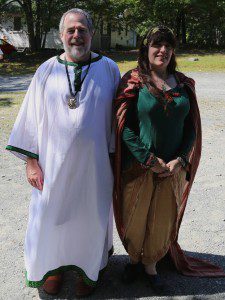
What’s the difference between religion and culture? It’s hard to find an explanation that isn’t loaded with Western, Christian assumptions. But as I generally understand it, culture is an expression of a peoples’ identity: who they are, what they do, what they value. Religion is an expression of their highest values and how they deal with the Big Questions of Life: why are we here? What’s the nature of Life? What happens after death?
There is significant overlap between religion and culture. I’ve heard it said (though I can’t remember where) that some of the remaining tribal societies have no word for religion, or if they do, it refers to what’s preached to them by Christian and Muslim missionaries. Their own “religious” beliefs and practices are simply part of who they are.
The inseparability of religion and culture holds true in our wider society as well. When I was growing up in Tennessee in the early 1970s, “Christian” meant “low church Evangelical Protestant,” but it also meant politically conservative, pro-Vietnam war, and anti-rock & roll. Smoking was a personal choice but drinking was a terrible sin.
Some try to separate culture and religion by insisting that religion deals with supernatural concerns, but that ignores non-theistic religion. Now, if an atheist says he doesn’t have a religion, it’s not my place to correct him. But as a Unitarian Universalist, I know plenty of very religious people who don’t believe in Gods, spirits, or anything else not blessed by science. Nontheistic religion is a real thing. Meanwhile, nontheistic polytheism is an oxymoron (I don’t want to reopen that particular shouting match, but take the prefix off and you have “nontheistic theism.” If that’s not an oxymoron I don’t know what is).
We’re building (or rebuilding or restoring or re-establishing – choose your favorite action verb) polytheist religions on purpose. We’re studying the ways of our ancestors. We’re engaging in various devotional practices and discussing their relative merits. We’re holding conferences to build relationships and share what we’ve learned.
We’re building polytheist culture by chance – it’s evolving without intent. Almost all of us come from the mainstream culture, a culture whose values are frequently at odds with polytheist values and that frequently tells us “you must follow our rules!” Many of us also come out of the wider Pagan culture, a culture that just as frequently insists “you can’t tell me what to do!” Neither of these approaches are particularly helpful in building a meaningful and powerful polytheist culture.
(As there are many polytheist religions, so will there be many polytheist cultures. The point isn’t that we must have one – we don’t, we won’t, and we can’t. The point is that just as there is considerable overlap of religious beliefs and practices among contemporary polytheists (particularly in North America), so will there be considerable overlap in culture. Diversity is never an excuse for “anything goes.”)

I’m not concerned with cultural markers like clothes (I prefer sturdy solid colors, with the traditional white Druid robe for rituals), food (roast pig or vegan delight?), or music (so long as it’s not crappy art, like the Pagan music of the 1980s or pretty much anything produced by and for Evangelical Christians). Rather, I’m concerned with what our polytheist culture values and respects and how it expresses that respect.
Let’s respect facts. As the saying goes, you’re entitled to your own opinion but not your own facts. A lot of what gets passed around in Pagan and even polytheist circles is outdated (i.e. – more recent scholarship has shown it to be in error) or speculative (impossible not to do when working with the distant past, but let’s understand the difference between what’s likely, what’s possible, and what’s not very likely).
We respect facts when we check sources, think through what we’re saying, and refuse to accept something just because it matches our preconceived notions or tells us something we want to hear. Let’s respect facts enough to put some effort into separating facts from speculation and from outright fantasy.
Let’s respect experience and learning. Appeal to authority is a logical fallacy and “because I said so” (or “because some published author said so”) is never sufficient grounds to accept a religious proposition. At the same time, someone who has been a priest for twenty years probably knows a thing or two about leading ritual. Someone who has published books on Celtic culture probably knows more about what the ancient Druids did than you do. Someone who grew up speaking Welsh probably knows more about old Welsh stories than someone who speaks and reads only English.
We have no credentialing bodies (do we need them? I don’t think so – certainly not yet), but it’s not hard to figure out who the experts and elders are. Assume they know what they’re talking about until you see they don’t.
We respect experience and learning when we humbly decline to assume we know it all, and when we understand that someone challenging your ideas isn’t attacking you. Listen with the intent to learn, not with the intent to rebut. If you think someone is wrong, present your case logically and politely. You may not change any minds, but at least you’ll build a reputation as a reasonable person.
Let’s respect religious experiences. One of the reasons the polytheist religions are growing is because they’re experiential religions. We take the wisdom of our experts and elders seriously, but if we are inclined and if the Gods and spirits agree (and they usually do, sooner or later) we can have our own religious experiences. For me, this is the “proof” of polytheism – in the moment the Gods are so real I laugh at the skeptics, even if 30 minutes later I’ll admit other interpretations might be valid.
 We need not accept everyone’s interpretation of their religious experiences. Some people don’t have the religious foundation and self-knowledge to accurately separate messages from the Gods from their own thoughts and desires (but that skill can be learned). If someone makes an experience-based claim that’s at odds with known facts, we are free to ignore it, or at least to decline to accept it.
We need not accept everyone’s interpretation of their religious experiences. Some people don’t have the religious foundation and self-knowledge to accurately separate messages from the Gods from their own thoughts and desires (but that skill can be learned). If someone makes an experience-based claim that’s at odds with known facts, we are free to ignore it, or at least to decline to accept it.
We respect religious experiences when we build and maintain a living religion that is rooted in the past without being stuck in the past.
Let’s build polytheist culture on purpose. Polytheist culture will evolve without any effort on our part. But that evolution will be slow and it will be constantly infiltrated by the mainstream culture. We can’t completely block that off (nor do I think it’s a good idea – we will all have at least one foot in the mainstream culture for the foreseeable future), but we have the opportunity to mindfully and intentionally create a polytheist culture based on polytheist values and virtues. There are many such values and virtues – these are the three I see as most needed and most helpful right now.














